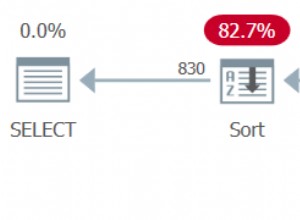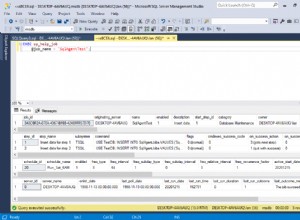Realmente no entiendo su pregunta, pero aquí hay un ejemplo de cómo reordenar una lista...
DROP TABLE IF EXISTS my_table;
CREATE TABLE my_table
(image CHAR(1) NOT NULL PRIMARY KEY
,position INT NOT NULL
);
INSERT INTO my_table VALUES
('A',1),
('B',2),
('C',3),
('D',4),
('E',5),
('F',6);
Entonces, digamos que queremos arrastrar la imagen en la posición 5 a la posición 2...
SET @old_position = 5;
SET @new_position = 2;
SELECT image
, position old_order
, ROUND(CASE WHEN position NOT BETWEEN LEAST(@old_position,@new_position) AND GREATEST(@old_position,@new_position)
THEN position
WHEN position = @old_position THEN @new_position
ELSE position+(((@new_position<@old_position)-.5)*2)
END
,0) new_order
FROM my_table;
+-------+-----------+-----------+
| image | old_order | new_order |
+-------+-----------+-----------+
| A | 1 | 1 |
| B | 2 | 3 |
| C | 3 | 4 |
| D | 4 | 5 |
| E | 5 | 2 |
| F | 6 | 6 |
+-------+-----------+-----------+
Aquí hay un ejemplo más completo, usando algo de PHP para exportar a HTML... tal vez alguien más pueda hacerlo bonito...
<?php
//simple_sorter.php
//Preamble
/*
A simple row repositioning script.
This is using a simple $_GET to determine which row is repositioned.
So you need to supply a source and a target in the url, e.g.:
https://path/to/simple_sorter.php?old_position=5&new_position=2
There is no error checking, so it can quite easily fall apart, and because
the SELECT comes befpre the UPDATE, you won't see any changes until the
next time you load the page.
*/
//Data Creation Statements
/*
DROP TABLE IF EXISTS my_table;
CREATE TABLE my_table
(image CHAR(1) NOT NULL PRIMARY KEY
,position INT NOT NULL
);
INSERT INTO my_table VALUES
('A',1),
('B',2),
('C',3),
('D',4),
('E',5),
('F',6);
*/
require('path/to/pdo/connection/stateme.nts');
//My understanding is that the following is needed
in order to replace (every instance within the
query of) :old_position and :new_position with
their corresponding values
$pdo->setAttribute(PDO::ATTR_EMULATE_PREPARES, TRUE);
//and now to the code...
$query = "
SELECT *
FROM my_table
ORDER
BY position
";
$stmt = $pdo->prepare($query);
$stmt->execute();
$data = $stmt->fetchAll();
print_r($data);
$query = "
UPDATE my_table x
JOIN
( SELECT image
, position old_order
, ROUND(CASE WHEN position NOT BETWEEN LEAST(:old_position,:new_position) AND GREATEST(:old_position,:new_position)
THEN position
WHEN position = :old_position THEN :new_position
ELSE position+(((:old_position>:new_position)-.5)*2)
END
,0) new_order
FROM my_table
) y
ON y.image = x.image
SET position = new_order
";
$old_position = $_GET['old_position'];
$new_position = $_GET['new_position'];
$stmt = $pdo->prepare($query);
$stmt->execute(array('old_position' => $old_position,'new_position' => $new_position));
?>
Salidas (por ejemplo, y dependiendo de qué valores se usaron y con qué frecuencia)...
Array
(
[0] => Array
(
[image] => A
[position] => 1
)
[1] => Array
(
[image] => D
[position] => 2
)
[2] => Array
(
[image] => E
[position] => 3
)
[3] => Array
(
[image] => B
[position] => 4
)
[4] => Array
(
[image] => C
[position] => 5
)
[5] => Array
(
[image] => F
[position] => 6
)
)




